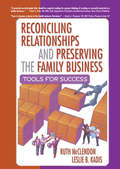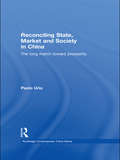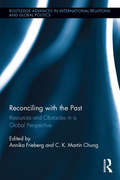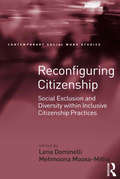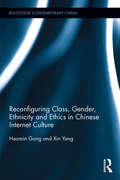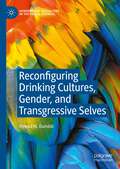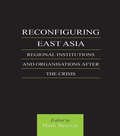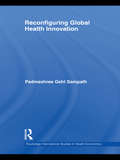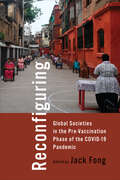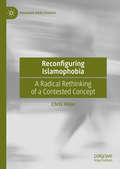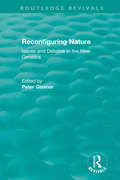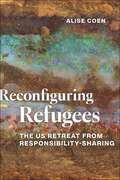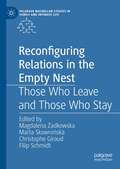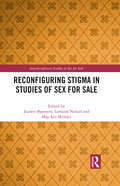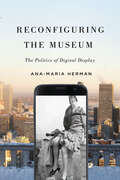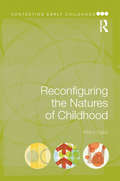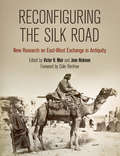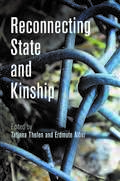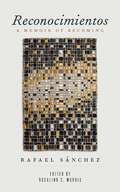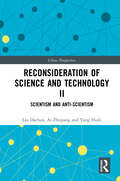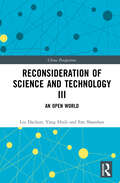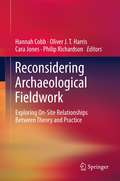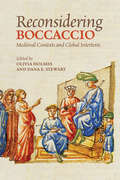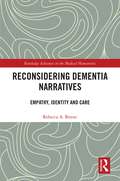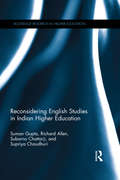- Table View
- List View
Reconciling Relationships and Preserving the Family Business: Tools for Success
by Ruth Mcclendon Leslie B KadisLearn how to keep family problems from affecting the family business! Reconciling Relationships and Preserving the Family Business: Tools for Success presents a comprehensive model for reconciling fractured relationships within the business-owning family. Studies show that more than two-thirds of family-owned businesses don't survive past the first generation-and more than 90 percent of all business enterprises in the United States are owned by families. Written by the founders of the Carmel Institute for Family Business, this unique book is an essential tool for people involved in family businesses, where personal issues can mix with financial interdependencies and work grievances to cause professional failures independent of bad management, market conditions, or financial constraints. Reconciling Relationships and Preserving the Family Business is a practical and concise guide to building healthy families and collaborative family business teams that last for generations. The book introduces the ideology that frames the Reconciliation Model for relationship repair, and defines two main systemic problems facing business-owning families: oppression and disengagement. It also presents an in-depth study of a business-owning family, demonstrating how the Reconciliation Model works-step-by-step. Reconciling Relationships and Preserving the Family Business addresses, including: basic principles of relationships in business-owning families individual dynamics that account for human dilemmas power issues effective intervention in troubled relationships assessing relationship patterns family structure and process roles, responsibilities, and ethics of advisors working with family-owned businesses and much more! Reconciling Relationships and Preserving the Family Business is a vital resource for members of business-owning families and for the professional people who advise them: lawyers, therapists, bankers, clinical social workers, accountants, consultants, and therapists. The book is invaluable for teaching you to recognize real or potential relational problems that can have an adverse effect on the family business.
Reconciling State, Market and Society in China: The Long March Toward Prosperity (Routledge Contemporary China Series)
by Paolo UrioAnalysing post-Mao China is not an easy task, but it is essential in order to understand the rationale and scope of the reform process started by the Chinese leadership under the guidance of Deng Xiaoping at the end of the 1970s. Thirty years after the beginning of the reform process China has become a major actor in the global economic and political system and the 21st century is generally held to the one in which China will become the major world power. In this book Paolo Urio presents a balanced picture of the reform process, analysing the economic, social, environmental, legal, political and cultural aspects of the process and showing the interconnections between them. As well as analysing the achievements realised thus far by the reform process, this book looks ahead at the difficulties the Chinese leadership will have to face in the years to come. As such, it will be essential reading for students and scholars of Chinese politics, public management and economics alike.
Reconciling with the Past: Resources and Obstacles in a Global Perspective (Routledge Advances in International Relations and Global Politics)
by Annika Frieberg C. K. Martin ChungAre countries truly reconciled after successful conflict resolution? Are only resource-rich regions capable of reconciliation, while supposedly resource-poor ones are condemned to recurring conflicts? This book examines the availability of various resources for political reconciliation, and explores how they are utilized in overcoming particular obstacles during the process. While the existing literature focus on themes such as justice, apology and resentment, the analysis here is centered on intellectual resources in terms of ideas, memory cultures, master narratives, economic incentives, civil society initiatives and object lessons. The research and comparative research in this volume are conducted by renowned regional experts from South Africa to the Asia-Pacific, thus providing multidisciplinary perspectives and new insight on the subject.
Reconfiguring Citizenship: Social Exclusion and Diversity within Inclusive Citizenship Practices (Contemporary Social Work Studies)
by Mehmoona Moosa-MithaCitizenship as a status assumes that all those encompassed by the term 'citizen' are included, albeit within the boundaries of the nation-state. Yet citizenship practices can be both inclusionary and exclusionary, with far-reaching ramifications for both nationals and non-nationals. This volume explores the concept of citizenship and its practices within particular contexts and nation-states to identify whether its claims to inclusivity are justified. This will show whether the exclusionary dimensions experienced by some citizens and non-citizens are linked to deficiencies in the concept, country-specific policies or how it is practised in different contexts. The interrogation of citizenship is important in a globalising world where crossing borders raises issues of diversity and how citizenship status is framed. This raises the issue of human rights and their protection within the nation-state for people whose lifestyles differ from the prevailing ones. Besides highlighting the importance of human rights and social justice as integral to citizenship, it affirms the role of the nation-state in safeguarding these matters. It does so by building on Indigenous peoples' insights about linking citizenship to connections to other people and the environment and arguing for the inalienability and portability of citizenship rights guaranteed collectively through international level agreements. These issues are of particular concern to social workers given that they must act in accordance with the principles of democracy, equality and empowerment. However, citizenship issues are often inadequately articulated in social work theory and practice. This book redresses this by providing social workers with insights, knowledge, values and skills about citizenship practices to enable them to work more effectively with those excluded from enjoying the full rights of citizenship in the nation-states in which they reside.
Reconfiguring Class, Gender, Ethnicity and Ethics in Chinese Internet Culture: Caught on the Web (Routledge Contemporary China Series)
by Haomin Gong Xin YangNew information technologies have, to an unprecedented degree, come to reshape human relations, identities and communities both online and offline. As Internet narratives including online fiction, poetry and films reflect and represent ambivalent politics in China, the Chinese state wishes to enable the formidable soft power of this new medium whilst at the same time handling the ideological uncertainties it inevitably entails. This book investigates the ways in which class, gender, ethnicity and ethics are reconfigured, complicated and enriched by the closely intertwined online and offline realities in China. It combs through a wide range of theories on Internet culture, intellectual history, and literary, film, and cultural studies, and explores a variety of online cultural materials, including digitized spoofing, microblog fictions, micro-films, online fictions, web dramas, photographs, flash mobs, popular literature and films. These materials have played an important role in shaping the contemporary cultural scene, but have so far received little critical attention. Here, the authors demonstrate how Chinese Internet culture has provided a means to intervene in the otherwise monolithic narratives of identity and community. Offering an important contribution to the rapidly growing field of Internet studies, this book will also be of interest to students and scholars of Chinese culture, literary and film studies, media and communication studies, and Chinese society.
Reconfiguring Drinking Cultures, Gender, and Transgressive Selves (Genders and Sexualities in the Social Sciences)
by Emeka W. DumbiliThis book presents an in-depth analysis of young people’s experiences of diverse drinking practices, including heavy drinking and drunkenness, as fun and pleasurable as they navigate gendered leisure spaces. Using qualitative data elicited through semi-structured interviews and focus group discussions, the analysis engages with theories and concepts of culture, gender, and transgression to foreground the roles that socio-cultural and material elements and human agency play in shaping alcohol consumption in contemporary Nigeria. It focuses on the enactment of hyper-heterosexual and alternative masculinities and the reconfigurations of passive and non-passive femininities through drinking practices. It also interrogates how and why multinational alcohol companies are targeting Nigerian women and youths and the extent to which their activities are contributing to changing gendered drinking and sexual practices, which are at odds with the extant local norms that promote abstinence, moderation among adults, and sexual purity among unmarried youths. Importantly, this book moves beyond solely Western theorizing by drawing on both Western and non-Western gender theories to analyze how contemporary Nigerian young men and women ‘do’ masculinity and femininity with alcohol and will be a valuable resource for social scientists, students, policymakers, practitioners, and the general public interested in youth drinking behaviours, multinational alcohol companies' activities, and decolonizing gender scholarship.
Reconfiguring East Asia: Regional Institutions and Organizations After the Crisis
by Mark BeesonFocuses both on specific regional organizations like ASEAN, The Asian Development Bank and APEC, as well as on key institutions such as East Asian legal systems, the media, organized labour, Asian business systems, and the developmental state.
Reconfiguring Global Health Innovation (Routledge International Studies In Health Economics Ser. #7)
by Padmashree Gehl SampathReconfiguring Global Health Innovation presents the findings of multi-year research, contrasting experiences of different latecomer countries in building health innovation systems to cater to local needs. It analyses the emerging industrial structures in health innovation as more and more latecomer countries are foraying into what is a highly difficult and technologically intensive sector, with the aim of finding ways and means to balance these promising developments with public health needs worldwide. The bookpresents empirical findings from six countries across Asia and Africa on health innovation, namely, India, Bangladesh, Vietnam, Kenya, Tanzania and Nigeria. The book concludes that the growth of knowledge and the accumulation of capabilities influence the ability of a country to generate wealth.
Reconfiguring Global Societies in the Pre-Vaccination Phase of the COVID-19 Pandemic
by Jack FongReconfiguring Global Societies in the Pre-Vaccination Phase of the COVID-19 Pandemic examines lived experiences of the COVID-19 pandemic in communities and societies around the world before the arrival of vaccines. This collection presents analyses of scholars from eight countries, all of whom were engaged in the unfolding crisis of social forces across the world. This timely volume conveys valuable insights about how public officials, the state, healthcare workers, and, ultimately, citizens responded to consequences of the pandemic upon not only the body but also social relations in community, city, and society. The contributing scholars document how state apparatuses, urban configurations, places of employment, legal structures, and ways of life responded to crisis-altered social conditions during the pandemic. The book investigates what societies experiencing crisis around the world reveal about the state’s efficacy and inefficacy in fulfilling its social contract for its citizens, especially on unresolved issues related to social relations based on politics, race, ethnicity, gender, and crime. This collection brings together a cross section of scholars experiencing the same temporal moment of crisis together, watching and observing how the pandemic of their age uncoiled itself into the fabric of community, onto the institutions and bureaucracies of society, and into the most intimate confines of the home.
Reconfiguring Islamophobia: A Radical Rethinking of a Contested Concept (Palgrave Hate Studies)
by Chris AllenThis book investigates the contested phenomena of Islamophobia, exploring the dichotomous relationship that exists between Islamophobia as a political concept and Islamophobia as a ‘real’ and tangible discriminatory phenomenon. In doing so, this book improves understanding about Islamophobia through arguing how this dichotomous contestation serves a number of functions. To do so, Allen radically reframes and reconfigures existing notions and understandings of Islamophobia. It does so in two ways. First, through presenting empirical data gathered from more than 100 victims of Islamophobic hate crime to categorically evidence that Islamophobia is indeed real and tangible. Second, through unrivalled ‘insider’ experience gained as an independent adviser on Islamophobia and associated issues to various political, community and third sector stakeholders. Challenging existing scholarly conceptions of Islamophobia, this book also challenges politicians and policymakers to do more.
Reconfiguring Nature: Issues and Debates in the New Genetics (Routledge Revivals)
by Peter GlasnerPublished in 2004, this collection will encourage and foster informed discussion of key issues as society comes to grips with the implications of genetic engineering, the mapping and sequencing of the human genome, and the advent of the post-genomic era. The contributors are prominent social scientists, health specialists, journalists, bioethicists and commercial representatives from the UK, Finland, Germany, Holland and Norway who are at the leading edge of current research. the book will therefore appeal to the interested public, health and other professionals, teachers and students. This book was originally published as part of the Cardiff Papers in Qualitative Research series edited by Paul Atkinson, Sara Delamont and Amanda Coffey. The series publishes original sociological research that reflects the tradition of qualitative and ethnographic inquiry developed at Cardiff. The series includes monographs reporting on empirical research, edited collections focussing on particular themes, and texts discussing methodological developments and issues.
Reconfiguring Refugees: The US Retreat from Responsibility-Sharing
by Alise CoenShows how domestic identity narratives and political polarization shape the sociopolitical response to refugeesThe United States once played a major role in global refugee resettlement, accounting for nearly two-thirds of all refugees resettled worldwide. However, in recent years, it has dramatically cut refugee admissions and implemented discriminatory policies on refugee protection. These policies have been justified amid intensifying xenophobic rhetoric against specific groups.In this book, Alise Coen explains why the monumental shift around refugee resettlement occurred, particularly in response to the high-profile conflict in Syria. She shows how refugees—and broader global migration debates—became contentious political issues in the US, revealing the many ways in which refugees have been increasingly weaponized as partisan symbols by Democrats and Republicans. The book calls attention to the power of rhetoric and identity narratives, and shows how the language used to talk about refugees fuels divisivepolicies.From the years leading up to the Trump administration’s policies targeting Muslim refugees to debates during the Biden administration around who deserves access to asylum, Coen examines how ideas about race, gender, and nativism shape US approaches toward migration. As arguments for “closing the border” continue to gain traction and politicians continue to use global displacement issues to further their agendas, Reconfiguring Refugees explores the ideas, meanings, and policies that undermine and influence US responsibility-sharing.
Reconfiguring Relations in the Empty Nest: Those Who Leave and Those Who Stay (Palgrave Macmillan Studies in Family and Intimate Life)
by Christophe Giraud Magdalena Żadkowska Marta Skowrońska Filip SchmidtThis edited volume traverses the spectrum of experiences that take place after children leave the family home and parents find themselves in the "empty nest" stage of life. Rather than focusing on measuring the intensity of empty nest syndrome or asking whether parents' marital satisfaction increases or decreases in this phase, the authors present rich qualitative data from across Poland and France to show that there is great variation in how families experience the empty nest, developing both a study on intimacy and love and on family solidarity. Throughout the book, themes of mixed emotions, nuanced attitudes, contradictions, and dissonance are explored while shedding light on "supporting actors" of the empty nest transition, such as family pets and material objects.
Reconfiguring Stigma in Studies of Sex for Sale (Interdisciplinary Studies in Sex for Sale)
by Jeanett BjønnessReconfiguring Stigma in Studies of Sex for Sale is about the production and effects of stigma in sex work or prostitution with contributions from four continents and different disciplines that taken together explore how such stigma is conditioned by differences in time, place, citizenship, gender, sexuality, class and race. Stigma is about relationships between people and also sets an interpretative frame whereby people understand and react to situations and actions, and the book is developed and organized to investigate this from various angles. It presents empirical studies that build on and expand the scholarship on stigma and sex work. This means that it contributes to a more complex understanding of stigma in sex work studies. Further, by using the example of sew work to explore how we can best understand the production and consequences of stigma, the book makes a contribution that is relevant for all scholars who work on stigma and stigmatization. The book is intended for academic audiences interested in sex work or prostitution, on the one hand, and stigmatization, on the other. It is also intended for students in a broad range of disciplines, as well as for practitioners and activists who encounter or work with stigmatization or stigmatized populations.
Reconfiguring the Museum: The Politics of Digital Display
by Ana-Maria HermanDigital media technologies have provided an occasion not only for novel ways to display and exhibit collections, but also for new politics to arise as museums and urban settings change. While some believe these changes are driven by humans, others see digital media technologies at the heart of these changes. Reconfiguring the Museum offers a third explanation that considers both the social and technical together and thereby captures the experimental nature of introducing novel digital media technologies to museums, and the uncertainty, messiness, contingency, and complexity involved. In this sociotechnical case study of a novel augmented reality app – first designed to exhibit collections from the Museum of London across the sprawling capital city, and later remade for the McCord Museum to display collections throughout Montreal – Ana-Maria Herman reveals how the app introduced unexpected new relations between the museums, their collections, advertising agencies, sponsors, technology companies, corporations, urban spaces, and end users. She shows how museum practices related to curating, designing, building, visiting, and modifying exhibitions were transformed, and how, in such unsettled arrangements, what we think of as old cultural politics can unexpectedly re-emerge, while new digital politics – related to big data, surveillance, and automated processes – may not necessarily materialize.A detailed account of emerging actors and practices involved in making digital exhibitions, Reconfiguring the Museum offers practical considerations for museum, culture, and heritage practitioners charged with creating digital displays and accounting for their success or failure.
Reconfiguring the Natures of Childhood (Contesting Early Childhood Ser.)
by Affrica TaylorIn this fascinating new book, Affrica Taylor encourages an exciting paradigmatic shift in the ways in which childhood and nature are conceived and pedagogically deployed, and invites readers to critically reassess the naturalist childhood discourses that are rife within popular culture and early years education.Through adopting a common worlds fram
Reconfiguring the Silk Road: New Research on East-West Exchange in Antiquity
by Victor H. Mair Jane HickmanFrom the Bronze Age through the Middle Ages, a network of trade and migration routes brought people from across Eurasia into contact. Their commerce included political, social, and artistic ideas, as well as material goods such as metals and textiles. Reconfiguring the Silk Road offers new research on the earliest trade and cultural interactions along these routes, mapping the spread and influence of Silk Road economies and social structures over time. This volume features contributions by renowned scholars uncovering new discoveries related to populations that lived in the Tarim Basin, the advanced state of textile manufacturing in the region, and the diffusion of domesticated grains across Inner Asia. Other chapters include an analysis of the dispersal of languages across the Eurasian Steppe and a detailed examination of the domestication of the horse in the region. Contextualized with a foreword by Colin Renfrew and introduction by Victor Mair, Reconfiguring the Silk Road provides a new assessment of the intercultural evolution along the steppes and beyond.Contributors: David W. Anthony, Elizabeth Wayland Barber, Dorcas R. Brown, Peter Brown, Michael D. Frachetti, Jane Hickman, Philip L. Kohl, Victor H. Mair, J. P. Mallory, Joseph G. Manning, Colin Renfrew.
Reconnecting State and Kinship
by Erdmute Alber Tatjana ThelenWithin the social sciences, kinship and statehood are often seen as two distinct modes of social organization, sometimes conceived of as following each other in a temporal line and sometimes as operating on different scales. Kinship is traditionally associated with small-scale communities in stateless societies. The state, meanwhile, is viewed as a development away from kinship as political order toward rational, impersonal, and functional forms of rule. In recent decades, theoretical and empirical scholarship has challenged these notions, but the underlying presumption of a deep-rooted opposition between kinship and the (modern) state has remained surprisingly stable.That this binary is so deeply engrained in Western self-understanding and knowledge production poses a considerable challenge to decoding their coproduction. Reconnecting State and Kinship seeks to trace the historical shifts and boundary work implied in the ongoing reproduction of these supposedly discrete or even opposing units of analysis. Contributors ask whether concepts associated with one sphere —including corruption, patronage, lineage, and incest—surface in the other. Policies and interventions modeled upon the assumed polarity can have lasting consequences for mechanisms of marginalization and exclusion, including decisions about life and death.Reconnecting State and Kinship not only explores the boundary-related and classificatory practices that reinforce the kinship/statehood binary but also tracks the traveling of these concepts and their underlying norms through time and space ultimately demonstrating the ways that kinship and "the state" are intertwined.Contributors: Erdmute Alber, Apostolos Andrikopoulos, Helle Bundgaard, Jeanette Edwards, Karen Fog Olwig, Victoria Goddard, Michael Herzfeld, Eirini Papadaki, Frances Pine, Ivan Rajković, Tatjana Thelen, Thomas Zitelmann.
Reconocimientos: A Memoir of Becoming
by Rafael SánchezWhat is the relationship between a writer’s life, milieu, and thought? In this daring and intellectually expansive text, part memoir and part political philosophy, the anthropologist Rafael Sánchez explores the forces and events that shaped him and the nations through which he moved. Reconocimientos is a book of both personal and political reckoning, from the thrillingly emancipatory possibilities of Venezuela’s plazas to the political promise and disappointments of revolution. Written in the final year of his life, Reconocimientos moves from scenes of Sánchez’s youth in Cuba to fieldwork on the cult of Maria Lionza in Venezuela to confront the terrifying and alluring forces of patriarchal privilege at the base of monumentalist authoritarianism. Sánchez’s intimate prose speaks with the urgency both of his own mortality and of the political crises of our moment. Amid the resurgence of patriarchy, hierarchy, and the valorization of inequality that have become pillars of populist movements in Latin America and beyond, Sánchez finds a residual radical possibility in ‘horizontal’ spaces, where the forces of mimesis permit manifold transformations.
Reconsideration of Science and Technology II: Scientism and Anti-Scientism (China Perspectives)
by Liu Dachun Ai Zhiqiang Yang HuiliIn reviewing and reconsidering the intellectual history of scientism and antiscientism, the authors assess the process of reasoning and prejudices of these contrasting viewpoints, while discussing the repercussions of scientific hegemony and its contemporary criticism. As the second volume of a three-volume set that proposes to reconsider science and technology and explores how the philosophy of science and technology responds to an ever-changing world, this title focuses on ideological trends centering around scientism and anti-scientism since the 19th century. The six chapters look into the emergence of scientism, instrumental reason, scientific optimism, scientific pessimism, scientific crisis and irrationalism and finally the deconstruction of scientism. The authors provide insight into the connections and biases of these disparate views and critiques, explore the influences of the hegemony of science and contemporary critique of science and evaluate the value of postmodernism and deconstructivism. The volume will appeal to scholars and students interested in the philosophy of science and technology, the ideology of scientism and anti-scientism, modernism and postmodernism, Marxist philosophy and topics related to scientific culture.
Reconsideration of Science and Technology III: An Open World (China Perspectives)
by Liu Dachun Yang Huili Fan ShanshanDrawing on debates from traditional and postmodern thoughts on science and technology, the title builds a new theoretical framework to reconsider science and technology, integrating the opposing viewpoints that either justify science or negate it. As the third volume of a three-volume set that proposes to reconsider science and technology and explores how the philosophy of science and technology responds to an ever-changing world, this final volume seeks to restore the cultural implications of science. Across the six chapters, the authors probe the prospect of a pluralistic scientific culture, including discussions of diversified value choices, the tension between reason and unreason, other binary characteristics of scientific knowledge, including objectivity and uniqueness, universality and locality, as well as the loss, awakening and reconstruction of scientific culture. The authors call for a transformation of scientific culture from a dominant culture to an affirmative one and envision a free and open world of science and technology. The volume will appeal to scholars and students interested in the philosophy of science and technology, the ideology of scientism and anti-scientism, modernism and postmodernism, Marxist philosophy and topics related to scientific culture.
Reconsidering Archaeological Fieldwork
by Philip Richardson Cara Jones Hannah Cobb Oliver J. HarrisDigging, recording, and writing are the three main processes that archaeologists undertake to analyze a site, yet the relationships between these processes is rarely considered critically. Reconsidering Archaeological Fieldwork asserts that each of these processes involves at least a bit of subjective interpretation. As a group of archaeologists work together to reconstruct an objective view of the past, at a particular time, at a particular site, their field methods and subjective interpretations affect the final analysis. This volume explores the important nature of the relationship between fieldwork, analysis, and interpretation. Containing contributions from a diverse group of archaeologists, both academic and professional, from Europe and the Americas, it critically analyzes accepted practices in field archaeology, and provide thoughtful and innovative analysis of these procedures. By combining the experiences of both academic and professional archaeologists, Reconsidering Archaeological Fieldwork highlights key differences and key similarities in their concerns, theories, and techniques. This volume will incite discussion on fundamental questions for all archaeologists, both old and new to the field.
Reconsidering Boccaccio: Medieval Contexts and Global Intertexts (Toronto Italian Studies)
by Olivia Holmes Dana StewartReconsidering Boccaccio highlights the great Florentine writer Giovanni Boccaccio’s remarkable achievements in the fourteenth century as a cultural mediator, his exceptional social, geographic, and intellectual range, and the influence of his legacy on numerous cultural networks. Grounded in Boccaccio’s own writings, Reconsidering Boccaccio brings a variety of methodologies and critical approaches to the works of one of the ‘three crowns’ of Italian literature. Containing essays by scholars not only of Italian literature, but also history, law, classics, and Middle Eastern literature, this collection is part of a vital movement to open up a dialogue among researchers in various areas of study that touch on the works of Boccaccio. The volume highlights the necessity of a technical and historical framework when approaching Boccaccio studies, while also shedding new light on the lives of women and their role in the reception of Boccaccio’s works.
Reconsidering Dementia Narratives: Empathy, Identity and Care (Routledge Advances in the Medical Humanities)
by Rebecca BitencReconsidering Dementia Narratives explores the role of narrative in developing new ways of understanding, interacting with, and caring for people with dementia. It asks how the stories we tell about dementia – in fiction, life writing and film – both reflect and shape the way we think about this important condition. Highlighting the need to attend to embodied and relational aspects of identity in dementia, the study further outlines ways in which narratives may contribute to dementia care, while disputing the idea that the modes of empathy fostered by narrative necessarily bring about more humane care practices. This cross-medial analysis represents an interdisciplinary approach to dementia narratives which range across auto/biography, graphic narrative, novel, film, documentary and collaborative storytelling practices. The book aims to clarify the limits and affordances of narrative, and narrative studies, in relation to an ethically driven medical humanities agenda through the use of case studies. Answering the key question of whether dementia narratives align with or run counter to the dominant discourse of dementia as ‘loss of self’, this innovative book will be of interest to anyone interested in dementia studies, ageing studies, narrative studies in health care, and critical medical humanities.
Reconsidering English Studies in Indian Higher Education (Routledge Research in Higher Education)
by Richard Allen Suman Gupta Supriya Chaudhuri Subarno ChattarjiThis book examines the status of English Studies in India, aspirations pinned on the subject by students, teachers, policy-makers and society in general, and how these are addressed at the higher education level. It presents analytical background discussions of the history and policy environment, and offers open-ended, multi-faceted and multi-vocal accounts of particular aspects of contemporary Indian English Studies, including curriculum, pedagogy, research, employment, relation to Indian vernaculars and translation studies. Reconsidering English Studies in Indian Higher Education is an invaluable source for anyone interested in: The relevant histories and higher education policies Professional concerns, including employment, management, teaching and scholarly practices, and negotiations in terms of socio-cultural life Student attitudes, experiences and aspirations Management ethos and academic work in a comparative perspective, informed by the situation and debates in the United Kingdom and United States of America The context of global English Studies and globalization The book will be of primary interest to academic readers such as students, teachers and researchers in English Studies in India, Britain and wherever the discipline is pursued at higher education level Suman Gupta is Professor and Chair in Literature and Cultural History at The Open University. Richard Allen is Professor Emeritus at the Department of English at The Open University. Subarno Chattarji is Associate Professor at the Department of English, University of Delhi. Supriya Chaudhuri is Professor Emeritus at the Department of English, Jadavpur University, Kolkata.
